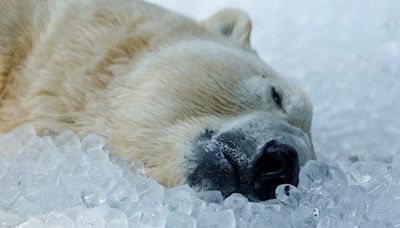Search results
The polar bear ( Ursus maritimus) is a large bear native to the Arctic and nearby areas. It is closely related to the brown bear, and the two species can interbreed. The polar bear is the largest extant species of bear and land carnivore, with adult males weighing 300–800 kg (660–1,760 lb).
Jun 29, 2024 · Polar bear, great white northern bear found throughout the Arctic region. The polar bear is the largest and most powerful carnivore on land, a title it shares with a subspecies of brown bear called the Kodiak bear.
The largest bear in the world and the Arctic's top predator, polar bears are a powerful symbol of the strength and endurance of the Arctic. The polar bear's Latin name, Ursus maritimus, means "sea bear." It's an apt name for this majestic species, which spends much of its life in, around, or on the ocean–predominantly on the sea ice.
Discover fascinating facts about polar bears and find out about our work with tracking polar bears in the Arctic.
Sep 8, 2017 · How do polar bears survive their Arctic habitat? Is climate change affecting their population? Learn how polar bears have adapted to life on top of the world...
Find out how these polar predators rule the Arctic. Get under their skin for a closer look at what keeps polar bears warm.
Majestic creature of the far north, the polar bear is the world’s largest terrestrial carnivore. Its Latin name, Ursus maritimus, means ‘sea bear’: an apt name for this amazing animal, which spends much of its life in, around, or on the water – predominantly on the sea ice.
The largest bear in the world and the Arctic's top predator, polar bears are increasingly at risk. Learn about threats to this bear, facts and how to help.
We’re dedicated to conserving polar bears and the sea ice they depend on. Through media, science, and advocacy, we work to inspire people to care about the Arctic, the threats to its future, and the connection between this remote region and our global climate.
Polar bears are the planet’s biggest land-based carnivores – although they actually spend most of their lives around water and ice (their Latin name means ‘sea bear’). So they’re at particular risk from global warming, which is melting the Arctic sea ice they depend on.



